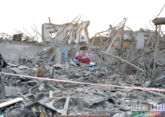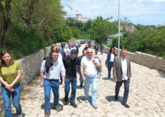Ranjana Srivastava, an Australian oncologist, award-winning author and Fulbright scholar, rises a topic of helping colleagues to cope with death of relatives and friends in her article How did we miss our colleague’s grief? for The Guardian.
Expecting to be greeted by an outpouring of sympathy, he walked into silence. When it comes to acknowledging death, all of society needs help. After decades of work and the constant demands of a busy life, a husband and wife take a trip abroad. One day they go for a walk in a national park. There workers are doing what they do, taking care of the surrounds. Suddenly, without warning, a chainsaw goes through its final motions and a large tree comes crashing down. He walks ahead but being a split second behind him she is trapped and sustains severe injuries. Precious time is lost being transported by road and air to one hospital, then to another and another. She suffers catastrophic brain damage and he has to make the decision to switch off her life support. Then he returns home alone. Picture his devastation. Imagine the survivor’s guilt.
Back at work, a shock of a different kind awaits. Expecting to be greeted by an outpouring of sympathy at his loss, he walks into silence. People go past him and look sideways. They make an off-colour joke. Or they work with him and say nothing. His raw grief craves acknowledgment. He knows that nothing will bring her back, but a simple recognition of his loss might just pull him through the day. After all, a sorrow shared is a sorrow divided.
He is heartbroken, first at his loss, and then at the way in which that loss is diminished by those who have known him, and them, all these years.
A year from the day the tree fell, he writes a heartfelt piece about the loneliness of grieving. I am reading the paper at dawn, shaking my head in dismay at his described workplace. Who behaves like that? Where does this happen? How do people let it happen?
And then, as I scroll back up, I nearly drop my iPad in surprise because I know him. He is a surgeon from my own institution who once taught me and later cared for some of my patients. We mostly communicated via phone but from time to time we met to discuss a problem. I bite my lip. This happened to him at our hospital. From here it is only one step to a deep discomfort as I rack my brains to figure out when we last met and whether I should have had an inkling of the tragedy. Was there a circular I had missed? Did someone hold a minute’s silence when I wasn’t there? Worse, did he and I sit together discussing the elective surgery waitlist while he kept expecting me to say something more profound? I am mortified at the thought.
At daybreak, I call him. My heart sinks when the operator casually mentions she hasn’t seen him lately. Fortunately, he answers, and my words tumble out. I am sorry for your horrific loss. I had no idea. And then, I can’t resist: had I seen him in the year since the accident and simply failed to ask how he was? Gently he puts my mind at rest, saying we had neither seen nor spoken to each other lately and I wasn’t to know. But it’s hardly a relief to learn that while I didn’t directly ignore his grief, our collective profession had and that the experience had been enough to discourage him from returning to work.
He tells me the stuff of love stories. They met on the first day of medical school and weathered the travails of training. The world respected her as an obstetrician but, more importantly, she was special to him. He enjoyed her company and had looked forward to a future with her. Nothing would bring her back but aside from his relatives he wanted the other important people in his life to simply say: “I was very sorry to hear about your wife’s death.” These people were the surgeons, anaesthetists, physicians, nurses, technicians, clerks and cleaners who a veteran surgeon sees more of than his own family.
But a total of three letters arrived, from trainees and secretaries. There was the odd text or email, almost begging to be ignored. From the rest, total silence. Eventually the thought of encountering that silence proved to be so powerful and decisive that he left the hospital. Better a graceful exit than shattered expectations.
He relates all this with unmistakable grace and poise, but I can’t help thinking of the twin deficit to society through the untimely death of one doctor and the resulting loss of another. An experienced and respected surgeon who stops operating but mentors trainees and leads by example is a prize. If holding on to such people requires the creation of a safe space, wouldn’t we want to do it every day?
It can be puzzling to think that doctors who walk countless patients through illness and mortality can be unintentionally remiss in the duty of care to their colleagues. I have no doubt that every doctor felt (very) helpless and (gratefully) guilty upon hearing the news. We witness enough random acts to know that it could have been any of us. But to translate our unspoken fears into able communication takes another leap – not so much of intellect, but rather emotion. Here we need reflection and self-correction, but I also can’t help wondering whether the growing pressures of paperwork and worthless administrative tasks will make it even harder for us to find the time and the will to actively care for each other. Without each other we are nothing, but more importantly, if we aren’t whole we can’t help our patients either.
My first patient has arrived and now I feel a pang of regret at this inadequate phone call one year after the event. I ask mundane questions like how he spends his day and who he has meals with. Grief has a long arc and “doing OK” is relative.
I end by saying that I was struck by the tone of forgiveness in his essay. He thoughtfully replies that when it comes to acknowledging death, all of society needs help. He is right and this is why you should read his complete essay.










